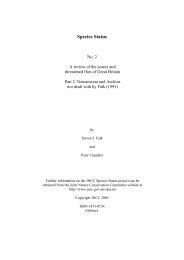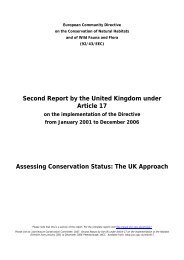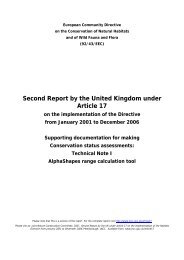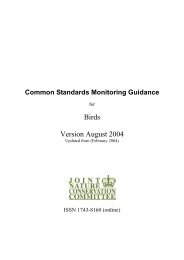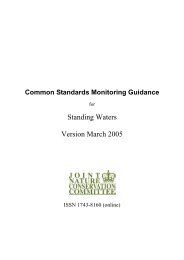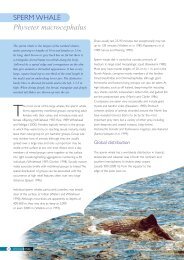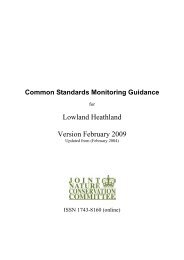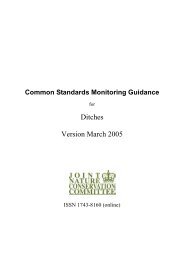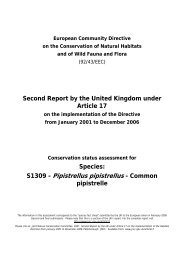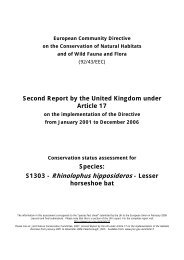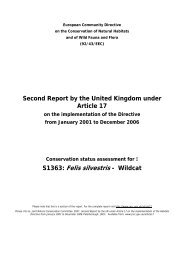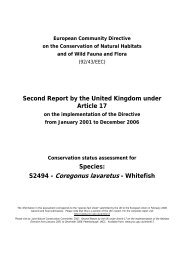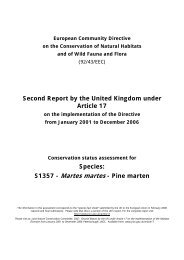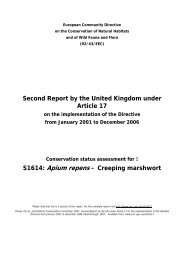UK Climate Change Programme 2006 - JNCC - Defra
UK Climate Change Programme 2006 - JNCC - Defra
UK Climate Change Programme 2006 - JNCC - Defra
Create successful ePaper yourself
Turn your PDF publications into a flip-book with our unique Google optimized e-Paper software.
64<br />
Transport<br />
Policies and measures<br />
12. The Government is committed to promoting<br />
sustainable transport and cutting transport<br />
emissions in the medium to longer term. The task<br />
of tackling emissions growth in this sector from<br />
strong sustained economic growth is challenging<br />
and a range of approaches will be required,<br />
including regulation, taxation, public spending<br />
and voluntary measures.<br />
• promoting the inclusion of aviation in<br />
emissions trading schemes and developing the<br />
evidence base around the possibility of<br />
including surface transport in emissions<br />
trading schemes in the future.<br />
Reducing the fossil carbon content<br />
of road transport fuels<br />
15. The 2003 Energy White Paper made clear that for<br />
transport to play its part in putting the <strong>UK</strong> on the<br />
path to a 60 per cent reduction in CO 2<br />
emissions<br />
by 2050, with real progress by 2020, there has to<br />
be a move towards low carbon and renewably<br />
produced fuels.<br />
13. Carbon dioxide emissions from transport depend<br />
on three key variables:<br />
I) the fossil carbon content of fuel consumed;<br />
II) the fuel efficiency of vehicles; and<br />
III) the distance travelled and the means of<br />
transport chosen.<br />
14. It is essential that we address all three of these in<br />
the most cost-effective and practical way<br />
possible. To achieve this we need to take action<br />
on a range of levels and that is exactly what we<br />
are doing by developing policies for:<br />
• reducing the fossil carbon content of road<br />
transport fuels;<br />
• improving the fuel efficiency of vehicles;<br />
• encouraging a move towards more<br />
environmentally friendly means of transport;<br />
and<br />
16. The Government published the Alternative Fuels<br />
Framework as part of Pre-Budget Report 2003.<br />
This set out the Government’s commitment to<br />
promoting the development of sustainable<br />
alternatives to fossil fuel, and affirmed the need<br />
for fiscal incentives to reflect environmental<br />
benefits. The framework committed the<br />
Government to a three-year rolling guarantee for<br />
biofuels and road fuel gas duty rates, offering<br />
certainty to support investment. Budget <strong>2006</strong><br />
announced that the 20 pence per litre duty<br />
incentive for bioethanol and biodiesel will be<br />
maintained to 2008-09.<br />
17. In November 2005 the Government announced it<br />
would introduce a Renewable Transport Fuel<br />
Obligation (RTFO). The RTFO requires transport<br />
fuel suppliers to ensure a set percentage of their<br />
sales are from a renewable source. It will be<br />
introduced in 2008-09, with the obligation level set<br />
at 5% in 2010-11. We estimate that this will lead<br />
to a 1.6MtC reduction in emissions. This figure<br />
follows the internationally agreed methodology for<br />
allocating emissions to individual states, which<br />
prevents global double counting of emissions.<br />
As such it does not take into account the carbon<br />
emitted during the production of biofuels which<br />
are produced abroad and used in the <strong>UK</strong>. When<br />
this is taken into consideration the net global<br />
reduction in carbon dioxide emissions is around<br />
1MtC, equivalent to taking one million cars off the<br />
road, without stopping people from travelling.



